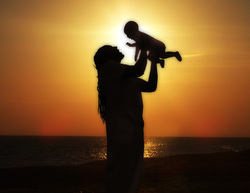
In the following article social worker and psychotherapist Lynn Lyons proposes that society (in her case American society but I think there are applications to South African society) catastrophises anxiety and because of this does not allow children to sit with any anxiety:
"In short, kids and parents are often so anxious about anxiety itself that they must prevent even the least anxious twinge—any feelings of uncertainty and discomfort. As anxious parents try to reassure, comfort, explain, argue, punish, and bribe their child out of the anxiety, they grow more and more emotionally reactive, angry, and distraught, even bursting into tears before ultimately capitulating.
...As a society, we’re obsessed with security, safety, and predictability. As good parents, we tend to think that we should keep our children from ever feeling afraid, upset, or vulnerable. After all, we have technology for keeping in constant touch with our kids, reassuring them and ourselves that we always have their backs. It makes us and them feel better, too, so why not use it?"
Lyons' argument is therefore that not allowing children to sit with anxiety fosters more of an intolerance to anxiety and thus even more anxious children. She emphasises the importance of teaching children to tolerate and cope with anxiety. Anxiety is an important part of our everyday lives - it is something we need to work with and use. How many significant events in your life have been free of anxiety? Large decisions? Public speaking? Emergency situations? Motivating your self to complete daunting tasks (at school, university or in the workplace)?
Lyons points out how handling anxiety is an important life skill for children (and adults):
"Here’s why not: kids need to be problem solvers. They need to learn how to improvise when things go awry, to take the next step when plans fall apart, in order to grow up. Anxiety will come. So will disappointments, grief, and, occasionally, even disaster. Sometimes our imaginations will be enough to make us panic, but sometimes our imaginations are just practice for the real thing. Children need to learn how to function with anxiety in the passenger seat. When we overprotect them, we deprive them of the practice needed to manage in the world."
The key message here is that we need to reformulate the way we think about and approach anxiety. This can be in our everyday lives as well as with more significant cases of anxiety that impact on our functioning. Ideally we could all manage our anxiety by ourselves but it is not uncommon that we sometimes need to seek professional help with our anxiety (especially when it disrupts our social and occupational functioning and quality of life). Lyons provides interesting case material of a family getting help for anxiety. Read her full article, Taming the Wild Things, here.
While sometimes it is important to work at building tolerance to anxiety as pointed out by Lynn Lyons and her case material (in more Cognitive Behavioural therapies), there are also other times when it may be key to understand the underlying cause or causes of anxiety (as in more Psychoanalytic or Psychodynamic psychotherapies). The latter approaches may also effectively reduce anxiety symptoms while simultaneously creating meaning.
I think it is also important to note that while children may need to learn to tolerate anxiety this level of anxiety needs to be age-appropriate and manageable for the child. It is up to parents to allow children to face anxiety but also to create healthy limits to what a child is exposed to.



 RSS Feed
RSS Feed